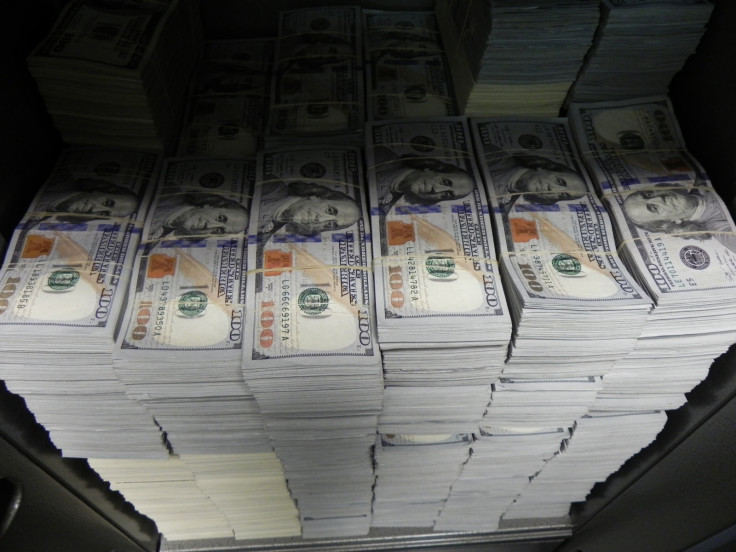Why are the Sinaloa Cartel the World's Most Powerful Gangsters?

The FBI landed a blow to the world's most powerful gang last week when it seized $100m (£62m) from the feared Sinaloa drugs cartel.
Nearly 1,000 officers took part in the major Los Angeles takedown in an attempt to destabilise the Mexican racket.
At one location during the operation on Wednesday 10 September, FBI agents seized nearly $3m in cash and searched dozens of businesses in the city's trendy fashion district alleged to have laundered money for Mexican drug cartels.
Crimes the cartel are accused of - including drugs trafficking, hostage taking, and money laundering in Los Angeles and elsewhere in the US and Mexico - built former gang leader Joaquin "El Chapo" Guzman a $1bn fortune and in 2012 a berth at number 63 in Forbes magazine's The World's Most Powerful People list (in 2013, he dropped to 67).
But, despite his vast empire, the net was closing in on the man dubbed Chicago's Public Enemy #1 because of the flow of drugs his cartel awashed the Windy City with, and Guzman was arrested in February.
However, if authorities thought cutting off the head of Sinaloa would lead to the cartel's implosion, they were mistaken, as the gang still holds sway over vast swathes of Latin America and the United States, and is thought to be the largest supplier of illegal drugs there.

Origins
Founded on the Pacific coast of Mexico in the 1980s, the Federation and the Blood Alliance, as the cartel was then known, was run by Mexico's original drug kingpin, Pedro Avilés Pérez.
Making an early fortune from marijuana, Pérez was known as the mastermind of aeroplane drops across the US.
Eventually, a new generation of leaders emerged and in 1995, Guzman assumed control of the cartel. He gained legendary status when after six years in a maximum security prison he escaped, after reportedly being wheeled out in a laundry basket, to continue the Sinaloa syndicate alongside Ismael Zambada García and Ignacio Coronel Villarreal.
Today, Sinaloa is said to have a presence in every major American city.

Finance
Mexico was, and remains, the conduit between Colombian drug producers and the mass US market - about half of the estimated $65bn worth of cocaine, heroin and other illegal drugs that American users buy each year enters its borders via the country.
Sinaloa is thought to make $3bn a year controlling the cross-border trade of Colombian cocaine, Mexican marijuana and methamphetamines.
As the empire grew, so did its ambitions and Sinaloa was soon transporting drugs across myriad of routes using speedboats, buses, a Boeing 747 and a custom-built submarine.
Another source of income was from the cartel's penchant for hostage taking. Announcing last week's $100m raid, the FBI said the group had been demanding payments of $100,000 and $40,000 from victims' families.
Black Market Peso Exchange
The Sinaloa also used a fraudlent currency exchange to boost its coffers. The peso exchange scheme turns dollars into Mexican currency through the sale of legitimate goods. The Mexican businesses that participated used drug money to purchase goods, which were then sold in Mexico for pesos. The proceeds were returned to the cartel in Mexican currency. This laundering process avoided the risk of smuggling large amounts of cash across the border.
Source: FBI
Violence
Tens of thousands of rivals are thought to have been murdered by Sinaloa lieutenants, earning Mexico City the title of "murder capital of the world".
In a warning to a Mexico mayor, 14 severed heads in iceboxes were left outside his office in 2012.
But, despite the bloodshed, observers claim Guzman wanted to give off the aura of a legitimate businessman and often used the cartel's financial might to buy off opposition rather than kill them.
The end?
Mexico was named one of the two most corrupt countries in Latin Americas in 2013 and it has long been claimed the Sinaloa have police as well as local and federal politicians on its payroll.
One member of the gang has even described how Mexican police provide protection for some of its deliveries, a claim disputed by authorities.
While the FBI hoped the raid would "send a message" to the cartel and its associates, the reality is Sinaloa will not be going away easily.
© Copyright IBTimes 2025. All rights reserved.






















